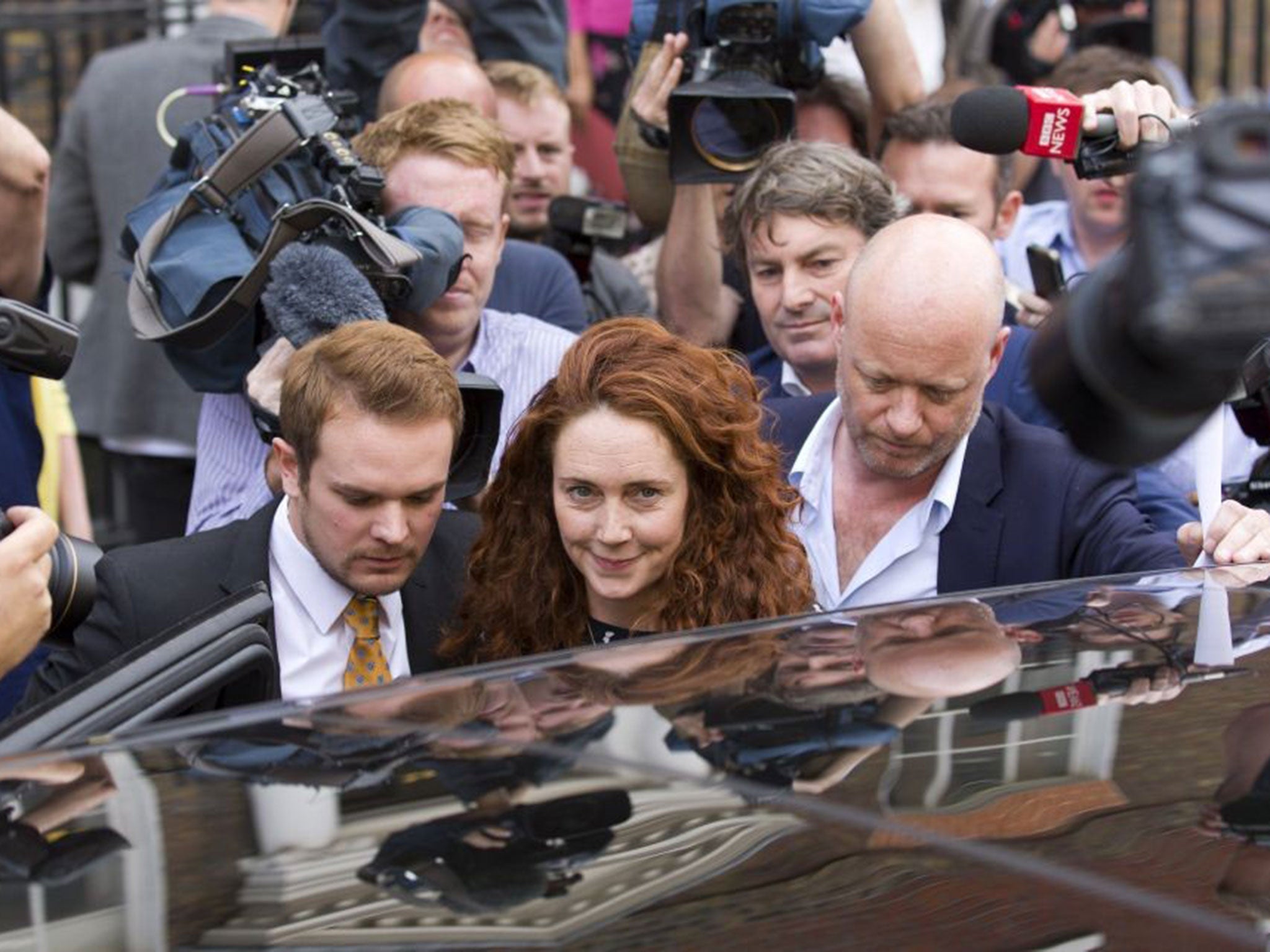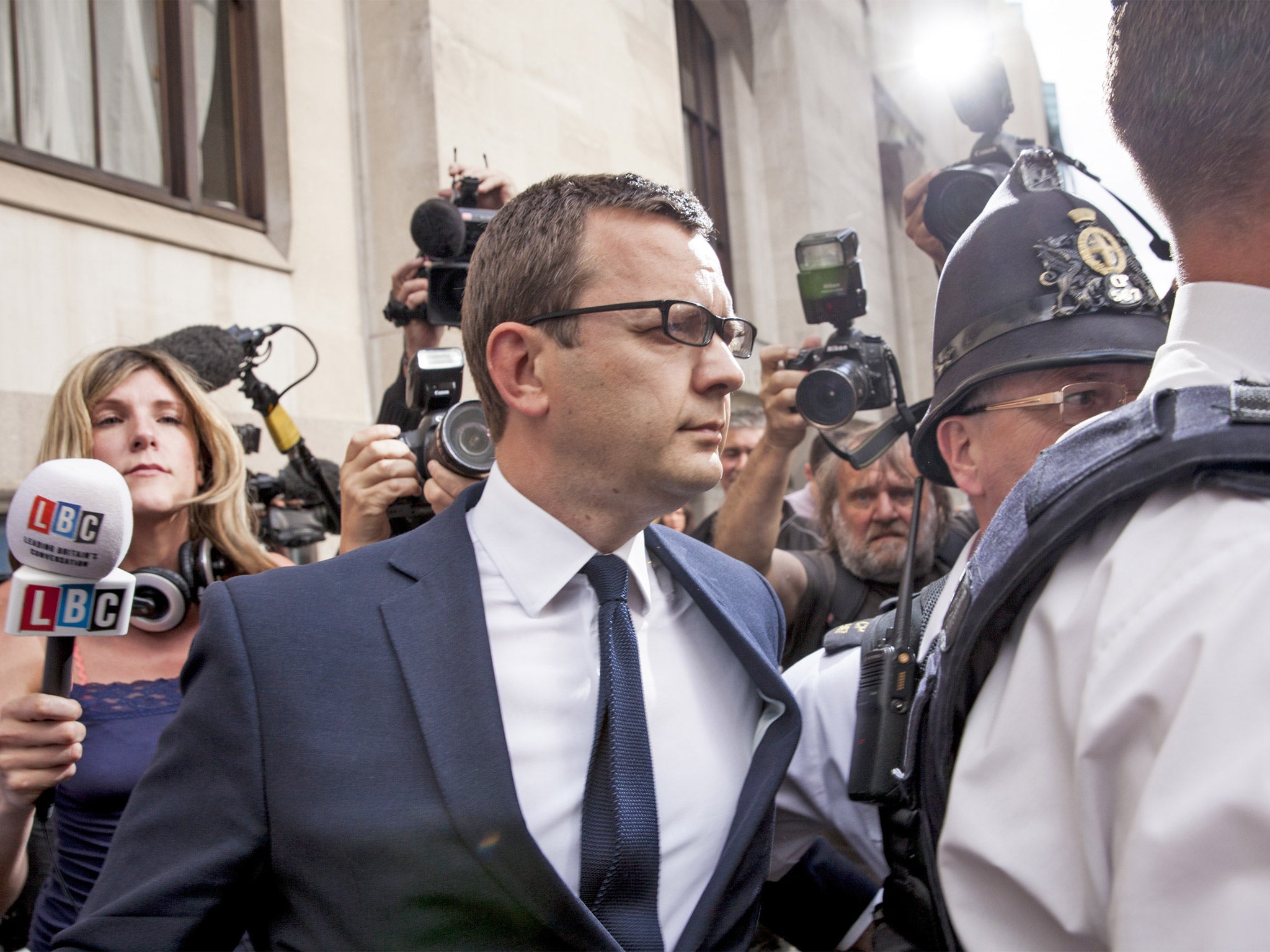Phone hacking: So what does the outcome of the trial mean for press regulation?
As Andy Coulson is found guilty of phone hacking charges, Tories will be anxious not to make enemies before the election

Ed Miliband should be deeply regretting his decision to pose with the Sun newspaper last month in what now looks like a public relations masterstroke by Rupert Murdoch’s News UK newspaper stable.
It paved the way for Wednesday’s triumphalist Sun front page in which, with breathtaking confidence, it celebrated the acquittal at the hacking trial of its former editor Rebekah Brooks under the headline “Great Day for Red Tops” alongside a large photo of the russet-haired former Queen of Wapping.
At the time of Miliband’s sorry participation in the Sun’s publicity stunt of shoving 20 million free copies of the tabloid through British letterboxes ahead of the World Cup, the umbrage at his action stemmed from the pain it caused to the victims of the Hillsborough tragedy, whose families and supporters still regard the paper as poisonous.
But there were wider consequences. Miliband may have laughably blethered about how he was only trying to “promote England’s bid to win the World Cup”, but he was also providing another stomach-churning image of a senior politician cravenly cosying up to the popular press – indeed the Murdoch press – which he had previously stood up to.
So when at the end of the hacking trial he, quite rightly, sought to embarrass the Prime Minister for having brought the now convicted criminal Andy Coulson into the heart of government, his position was severely weakened. He no longer stood apart from Rebekah and Andy’s great friend David Cameron or Tony Blair, who, the trial jury heard, had offered free consultancy to Rupert and Rebekah in their darkest hours.

All of this has significant consequences for the future regulation of the press. Ed Miliband – along with his deputy Harriet Harman – has sat in the box seat in driving Parliament’s attempts to reform newspaper culture and he hosted in his private office a late-night meeting – attended by members of the campaign group Hacked Off – when the Royal Charter on press reform was finalised.
That Royal Charter is being ignored by the papers and last week’s Old Bailey verdicts were taken by most of Fleet Street as confirmation that the entire three-year process to call it to account – from the Leveson inquiry to Scotland Yard’s Operation Weeting – had been a colossal waste of public funds. “£100m phone-hacking trial ends in Brooks walking free”, as The Daily Telegraph reported the story (with no mention of Coulson’s conviction until the fifth paragraph).
It was not just News UK that had an interest in Rebekah Brooks being cleared. Much of the rest of Fleet Street also breathed a sigh of relief. The sight of the most recognisable figure in British newspapers being hauled away to prison would have provided a narrative for film-makers and authors that could have damned the industry’s reputation for a generation. It could have derailed the new Independent Press Standards Organisation (Ipso), which the newspapers will use to bypass the Royal Charter.
Video: Rebekah Brooks is cleared of phone hacking charges
As it is, the Daily Mail could suggest in an editorial that the not guilty verdicts for Brooks, her husband Charlie and others including her PA Cheryl Carter, had exposed “the baselessness of [Cameron’s] decision to call the Leveson inquiry – which has cast such a chill over press freedom – in his panic-stricken bid to distance himself from the Murdoch papers he had so assiduously courted”.
Miliband, who last year showed considerable bravery in standing up to the Mail as it traduced his late father and who has personal reasons for wanting to curb the more bullying tendencies of the press, should be regretting his own assiduous courting of Murdoch.
Heady with a sense that they’re almost out of the woods, the papers that have fought hardest against reform invoked extreme language in arguing they should be allowed to just get on with the job. “We face unprecedented danger from Islamic terror,” noted The Sun, as it pointed out that the money spent on the hacking trial could have been used by a Foreign Office counter-terror unit that is facing £15m in cuts. The Mail compared the jailing of three Al Jazeera journalists in Egypt last week to Mr Cameron’s assault on “300 years of press freedom” in the UK.
While The Independent and The Guardian focused on the historic moment of the jailing of a senior Downing Street official, there was a sense in the wider press that Coulson was not so important. His offence may have occurred when he was editing Britain’s biggest-selling newspaper, but he had left the industry for PR. He is Cameron’s problem now.
Hacked Off – which has waited for this moment since its inception after the phone-hacking of Milly Dowler – is running out of cards to play. I was at its press conference on Thursday when it released film of Milly’s elder sister Gemma attacking Ipso as “fake” and condemning the “incestuous relationship between our top politicians and the press”. Again, these words are less helpful to Miliband after his flirtation with The Sun. On Friday night, Hacked Off organised a Twitter “thunderclap” of simultaneous tweets to demand Leveson compliance. It’s becoming desperate.
Ipso starts work in September with the widely-admired Sir Alan Moses as its chairman. Although The Independent and The Guardian have yet to sign up, the latter noted in its post-verdict editorial that tabloid behaviour had improved in the past three years. “Public life in Britain feels a cleaner place as a result,” it said.
David Wolfe QC was last week made inaugural chairman of the Royal Charter’s recognition panel but is unlikely to have any significant publishers to recognise.
For Hacked Off, which wants to force the press to abide by the Royal Charter, the difficulty is convincing the public of the significance of subtle differences between Ipso and the system outlined by Leveson. New Culture Secretary Sajid Javid is regarded as a dove by Fleet Street, and the Tories will be anxious not to make enemies in the press before the election. Labour is committed to a process that means Ipso has until at least autumn 2015 to establish itself.
Miliband has missed his chance. When he finally sank his teeth into the Prime Minister over the demise of Coulson, the public was soon looking elsewhere, at Luis Suarez doing something similar with an Italian defender.
Twitter: @iburrell
Join our commenting forum
Join thought-provoking conversations, follow other Independent readers and see their replies
Comments